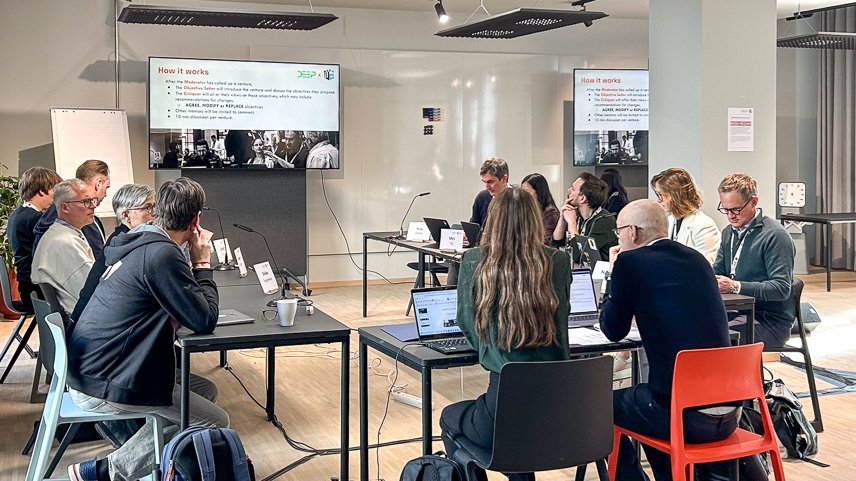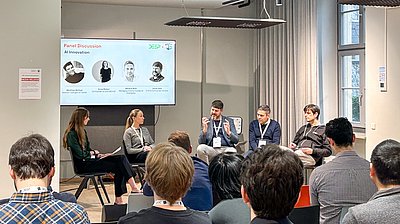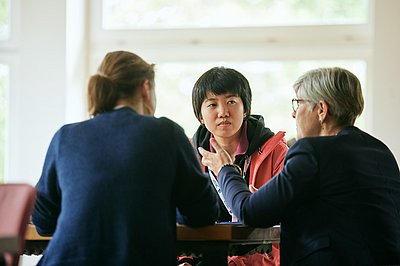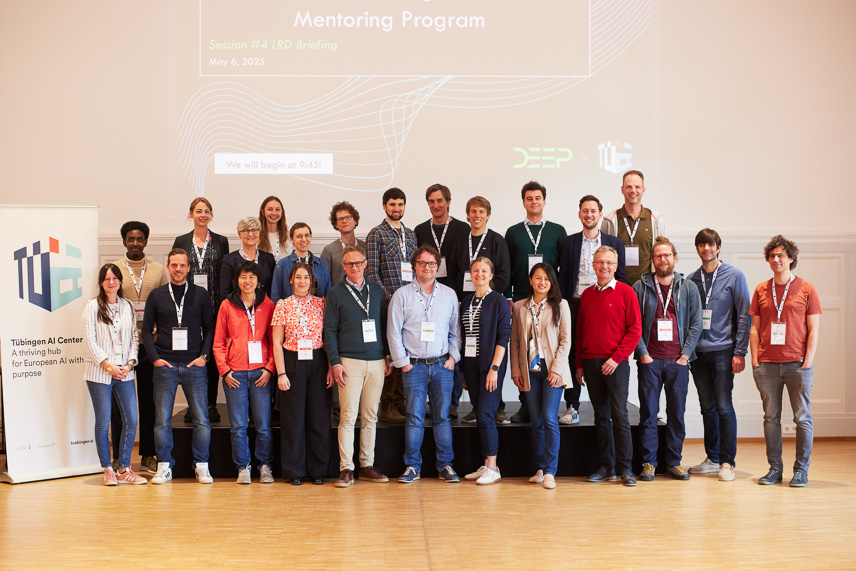From October 2024 through May 2025, the program brought together AI researchers, entrepreneurs, and venture mentors to turn scientific insights into impactful ventures.
The DEEP X Tübingen AI Mentoring Program was initiated by Matthias Bethge, Director of the Tübingen AI Center, and Thorsten Lambertus, Managing Director of the Institute for Deep Tech Innovation DEEP at the European School of Management and Technology ESMT. The program has been designed to stimulate entrepreneurial talent at the intersection of science and business. The partners aim at establishing a leading AI sciencepreneurship initiative in Europe. They put together a program inspired by the Creative Destruction Lab, a world-leading start-up mentoring program, which offers intensive mentoring, venture development support, and access to a unique network of researchers, investors, and founders.
In the first round, the Tübingen AI Center and the Cyber Valley network selected nine AI spin-outs across various industries. In four one-day sessions, these teams have been supported by 22 high-caliber mentors in their commercialization and business development.

Coaching a tech start-up from the fashion industry
Peter Gehler, one of the mentors and initiators of the program and affiliated with the Tübingen AI Center, shared his experience working with the start-up fara.ai. "I met the team at the third session in Munich," he reported. "fara.ai conducts AI-supported trend analysis & forecasting for the fashion industry based on images and videos from fashion shows, advertisements and social media as well as internal data from partners. They analyze the current style trends and extract insights that bring direct value to their business customers."
The team consists of four people from the Stuttgart and Tübingen region and had already taken part in the textile accelerator "Stoff im Kopf." Between the third and fourth sessions of the DEEP X Tübingen AI program, Gehler met with the team several times to advise them on technical and strategic questions regarding color matching. "Their pitch for automated trend analysis was impressive; they have working systems and engage with several customers. A great example of a start-up that was able to benefit from the program at exactly the right time."

fara.ai: How to bridge AI research and application in fashion
Eric Scholz and Ian Kampwanyi from the startup fara.ai joined the DEEP X Tübingen AI Mentoring Program to stress-test their application of AI in fashion and to connect with experts and mentors beyond their existing network. The recommendation to apply came through academic contacts from the University of Tübingen, where their roots lie.
At the time they joined, the team had already built an MVP (Minimum Viable Product) and was looking for a 360-degree feedback on their venture. They were positively surprised by the depth of expertise available in the program. “We thought it would be like other programs - talking about how startups work in general. But here, we could ask AI professors about our MVP,” Ian recalled.
Mentors from own industry offer valuable input

What stood out to both founders was the access to high-caliber mentors – especially those with domain knowledge. Two mentors had backgrounds at Zalando, Germany’s largest online fashion retailer, which brought highly relevant industry insights. “That was obviously highly valuable for our industry case,” Eric emphasized. Another mentor of fara.ai added: “It is very rewarding when I see the venture team make progress, especially with my guidance
- and when friendship is established and mentors and mentee meet for lunch after the program, which has happened twice.” Other mentors stress that it is a mutual learning process: the mentors learn from their mentees and vice versa.
An additional crucial aspect for fara.ai was the variety of perspectives offered by mentors from different sectors, including agriculture, logistics, and enterprise software. This mix led to new impulses and fresh thinking. Legal advice – often costly and difficult for early-stage ventures to access – was made accessible through the program. Ian described this as “absurdly valuable for a young company which is learning about the importance in even the smallest details.”
Small group sessions offer tailor-made advice

The workshop sessions, especially in-person ones like those in Munich, were highlights for the team. They appreciated the opportunity for small-group mentoring. “Every piece of advice was tailored to our startup”, Ian explained. While the online formats were still valued, Eric emphasized: “The depth and personal connection of face-to-face conversations make them especially inspirational.”
Among the most rewarding insights was recognizing that their work borders on academic research. “We do not have a simple product – what we work on is even closer to research than we thought,” Eric said. The fact that professors debated the same technical problems they were tackling in their startup validated the relevance and significance of their approach.
Valuable contacts and ongoing support after the program
Contacts formed during the program proved valuable beyond the workshops. Some mentors even offered continued support after the program’s end. “Getting this door opened is valuable … someone who previously worked at some company brings you into the conversation and tells them, ‘I vouch for these people,’” Eric reflected.
During the program, the startup secured a funding round and began preparing for growth. Next steps include advancing their AI models, especially in computer vision and forecasting, expanding the team, and exploring academic partnerships. “We want to stay unique, but we also want to change the world for the better,” Eric concluded.

MindfulCyber: Perception of safety complements technical robustness

Another founder who experienced DEEP X Tübingen AI as transformative is Meri Roboçi, CEO of MindfulCyber, a cybersecurity platform leveraging AI as a co-pilot security advisor. “My motivation to join the Tübingen AI program was to connect with a like-minded community dedicated to responsible AI innovation,” said Meri. With a background in AI governance and cybersecurity in the financial sector, she appreciated the program's emphasis on ethics, human-centered design, and regulatory alignment.
When joining, MindfulCyber was in the early concept and prototyping stage. The program helped Meri refine her business model, validate assumptions, and connect with experts across academia and industry. “The mentors were truly engaged. One insight that shaped our approach was understanding that in cybersecurity, the perception of safety can be as crucial as technical robustness,” she said. This led to a new focus on emotionally aware design in their training modules.
By the end of the program, Meri described MindfulCyber as a structured venture with a validated problem statement, initial prototype, clear user personas, and a roadmap for market entry. “Being part of the DEEP X Tübingen AI program has been a catalyst moment. It sharpened our thinking, challenged our assumptions, and gave us a solid springboard to move from idea to action.”
